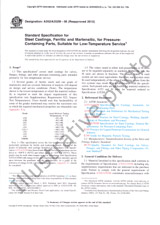We need your consent to use the individual data so that you can see information about your interests, among other things. Click "OK" to give your consent.
ASTM A707/A707M-19
Standard Specification for Forged Carbon and Alloy Steel Flanges for Low-Temperature Service
Translate name
STANDARD published on 1.11.2019
The information about the standard:
Designation standards: ASTM A707/A707M-19
Publication date standards: 1.11.2019
SKU: NS-976069
The number of pages: 6
Approximate weight : 18 g (0.04 lbs)
Country: American technical standard
Category: Technical standards ASTM
The category - similar standards:
Annotation of standard text ASTM A707/A707M-19 :
This specification covers forged carbon and alloy steel flanges intended primarily for petroleum and gas pipelines in areas subject to low ambient temperatures. Eight grades, four yield-strength classes, and three different notch toughness levels are included. All material shall be heat treated by annealing, normalizing, precipitation hardening, quenching-and-tempering, normalizing-and-tempering, normalizing-and-precipitation hardening, or quenching-and-precipitation hardening. A chemical heat analysis shall be made and conform to the requirements as to chemical composition specified. The material in the weld neck shall conform to the mechanical property requirements specified. Hardness test, impact test, ultrasonic test, tension test, and hydrostatic test shall be made to conform to the specified requirements.
Keywords:
carbon equivalent, piping applications, pressure containing parts, residual elements, steel flanges, steel forgings, alloy, steel forgings, carbon, temperature service applications, low,, ICS Number Code 23.040.60 (Flanges, couplings and joints)
Additional information
| 1. Scope | ||||||||||||||||
|
1.1 This specification covers forged carbon and alloy steel flanges intended primarily for petroleum and gas pipelines in areas subject to low ambient temperatures. Included are flanges to specified dimensions or to dimensional standards such as those MSS, ASME, and API specifications that are referenced in Section 2. 1.2 Supplementary requirements are provided for use when additional requirements are desired. These shall apply only when specified individually by the purchaser in the order. 1.3 Eight grades, four yield-strength classes, and three different notch toughness levels are included. 1.4 The availability of a particular size of flange of a specific grade and class is limited only by the capability of the composition to meet the specified mechanical property requirements. However, current practice normally limits the following: (a) Grade L1 to Classes 1 and 2, (b) Grade L2 to Classes 1, 2, and 3, (c) Grade L3 to Classes 1, 2, and 3, (d) Grade L4 to Classes 1, 2, and 3, (e) Grade L7 to Classes 1 and 2, and (f) Grades L5, L6, and L8 are generally available in any class. 1.5 This specification is expressed in both inch-pound units and in SI units. However, unless the order specifies the applicable “M” specification designation (SI units), the material shall be furnished to inch-pound units. 1.6 The values stated in either inch-pound units or SI units are to be regarded separately as standard. Within the text, the SI units are shown in brackets. The values stated in each system are not exact equivalents; therefore, each system must be used independently of the other. Combining values from the two systems may result in nonconformance with the specification. 1.7 This international standard was developed in accordance with internationally recognized principles on standardization established in the Decision on Principles for the Development of International Standards, Guides and Recommendations issued by the World Trade Organization Technical Barriers to Trade (TBT) Committee. |
||||||||||||||||
| 2. Referenced Documents | ||||||||||||||||
|
We recommend:
Updating of laws
Do you want to be sure about the validity of used regulations?
We offer you a solution so that you could use valid and updated legislative regulations.
Would you like to get more information? Look at this page.




 Cookies
Cookies
